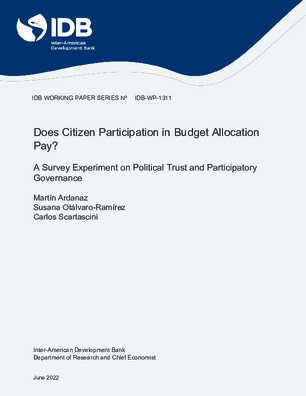Does Citizen Participation in Budget Allocation Pay? A Survey Experiment on Political Trust and Participatory Governance
Date
Jun 2022
Journal version
Participatory programs can reduce the informational and power asymmetries that engender mistrust. These programs, however, cannot include every citizen. Hence, it is important to evaluate not only if they affect allocations and trust among those who participate, but also if they could also affect trust among those who do not participate. We assess the effect of an informational campaign about these programs in the context of a survey experiment conducted in the city of Buenos Aires, Argentina. Results show that providing detailed information about a participatory budget initiative shapes voters' assessments of government performance and political trust. Effects are larger for individuals with ex ante more negative views about the local governments quality and for individuals who believe in the ability of their communities to solve the type of collective-action problems that the program seeks to address. Because mistrustful individuals tend to shy away from demanding the government public goods that increase overall welfare, well-disseminated participatory budget programs could affect budget allocations directly and through their effect on trust. Investing in these programs could be worthwhile.




